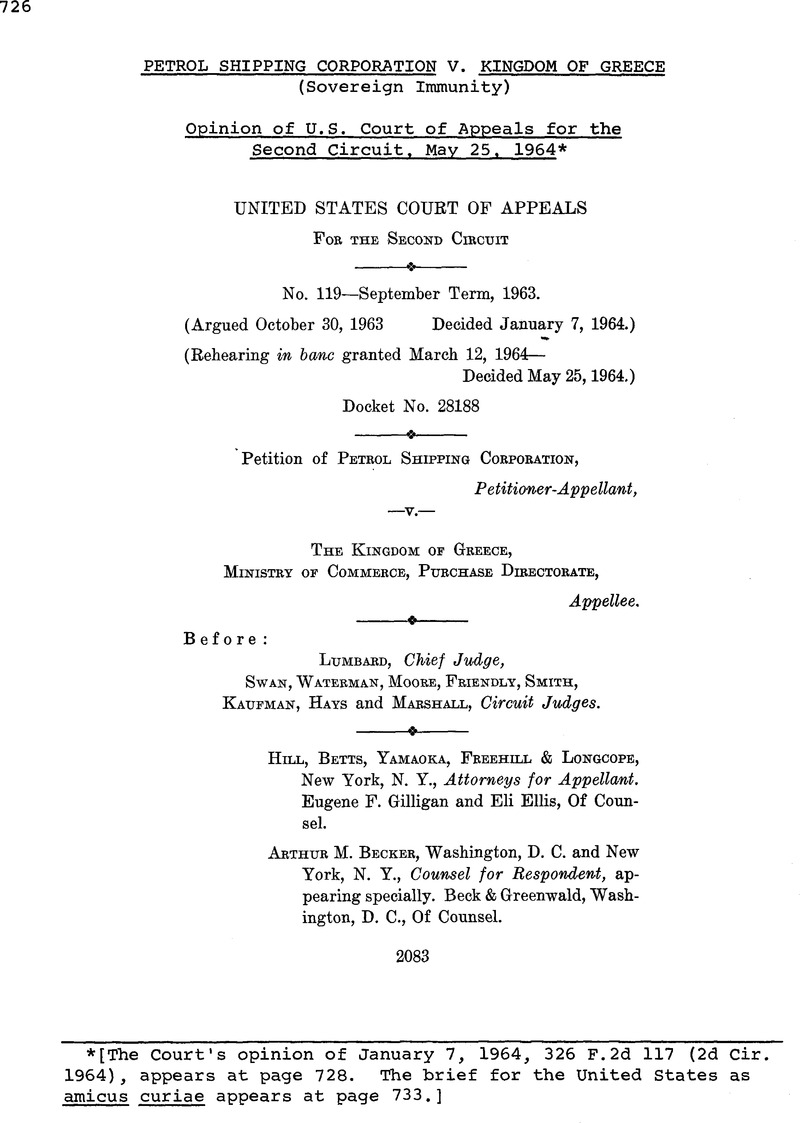No CrossRef data available.
Article contents
Petrol Shipping Corporation v. Kingdom of Greece (Sovereign Immunity)*
Published online by Cambridge University Press: 18 May 2017
Abstract

- Type
- Judicial and Similar Proceedings
- Information
- Copyright
- Copyright © American Society of International Law 1964
Footnotes
[The Court’s opinion of January 7, 1964, 326 F.2d 117 (2d Cir. 1964), appears at page 728. The brief for the United States as amicus curiae appears at page 733.]
[The decision of the Court of May 25, 1964, altering the decision reported here, appears at page 726. The brief for the United States as amicus curiae appears at page 733.]
References
1 The grain was purchased under an agreement between the United States and Greece made pursuant to the Agricultural Trade Development and Assistance Act, 7 U. S. C. A. $1691 et seq.
2 It should be noted that the arbitration clause provided that “for the purpose of enforcing any award, this agreement may be made a rule of the Court.” Petitioner’s suit sought an order directing appointment of an arbitrator, not an order enforcing an award.
1 The Puente case—unlike the Sullivan case—has never been cited in the Supreme Court and very rarely (almost never in recent years) in lower federal courts, undoubtedly because the later events recounted in the text showed it a less extensive precedent than as here cited.
2 For discussion of this trend see, e.g., Timberg, Expropriation Measures and State Trading, 1961 Proc. Am. Soc. Int. L. 113, 118.
* [This brief was filed with the Court on April 13, 1964. The briefs of Petrol Shipping Corporation and the Kingdom of Greece have not been reproduced.
[The opinions of the U.S. Court of Appeals for the Second Circuit of May 25, 1964, and January 7, 1964, appear at pages 726 and 728.]
1/ Reliance was placed upon an earlier decision by this Court which drew a similar distinction, Puente v. Spanish Nat. State, 116 P. 2d 43, certiorari denied, 314 U.S. 627.
2/ Two days earlier on March 10, this Court (Judges Smith, Kaufman and Marshall) heard oral argument in another appeal involving issues similar, at least in part, to those in the present case. Victory Transport v. Comisaria General, No. 28636. In the Victory Transport case, the trial judge considered on the merits the Spanish Government’s defense of sovereign immuniry, even though no attempt had been made there to establish the right to such immunity through State Department channels. However, the trial judge, in considering the defense on the merits, proceeded to reject it on the ground that what was involved was “a commercial operation of the Spanish Government and as such the defense of sovereign immunity is not available.”
3/ Thus, we express no opinion as to the effectiveness of the service of process to obtain personal jurisdiction over the appellee; whether the “Act of State” doctrine might have any application to the instant case; whether the State Department would have supported the appellee’s sovereign immunity claim if the appellee had applied to the Department; or any other issues apart from the procedures for filing pleas of immunity on behalf of foreign sovereigns and the consequences thereof.
4/ For additional factors which courts should perhaps take into account in determining whether immunity should be accorded a foreign government in a particular case, see, National City Bank v. Republic of China, supra, 348 U.S. at 361-365.
5/ 26 Dept. of State Bull. 984 (1952).
6) It should be noted that if the appellee has presented its Immunity claim to the State Department, the Department would undoubtedly have required the submission of more facts before making its own determination in this case. Since the appellee has followed the alternate procedure, it would seem that the appellant should not be deprived of the benefit of a ruling based upon consideration of all of the circumstances.




